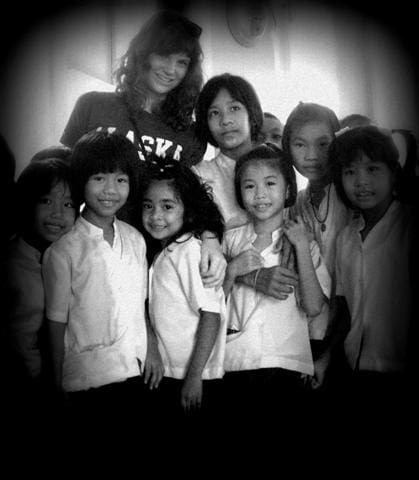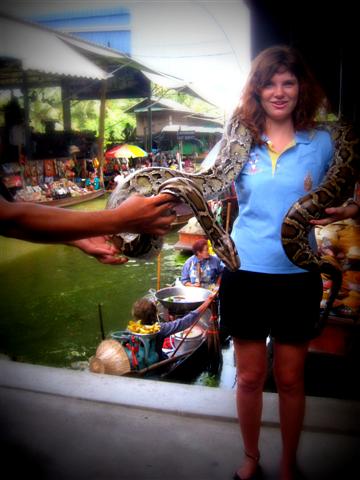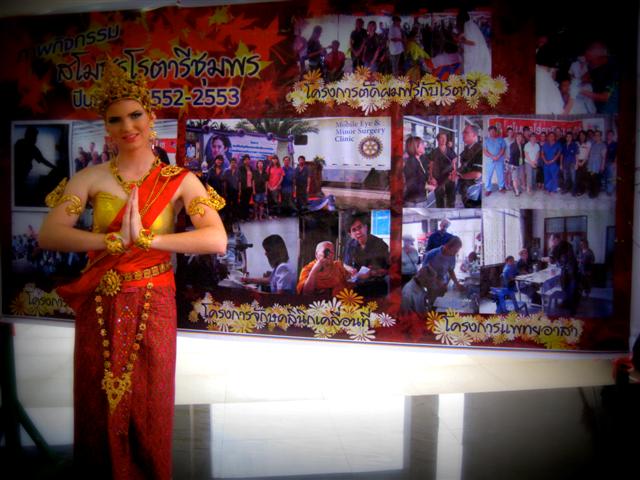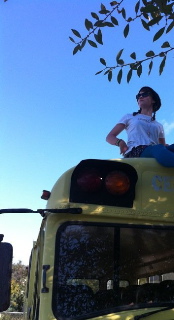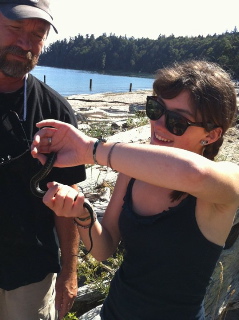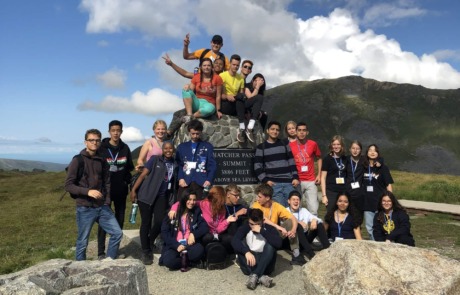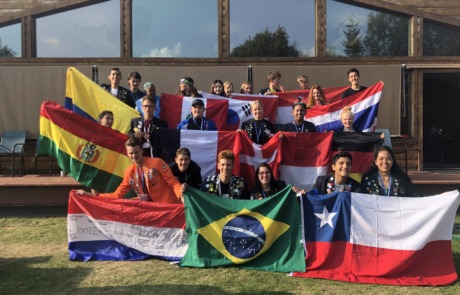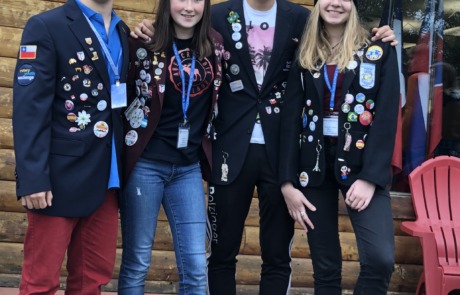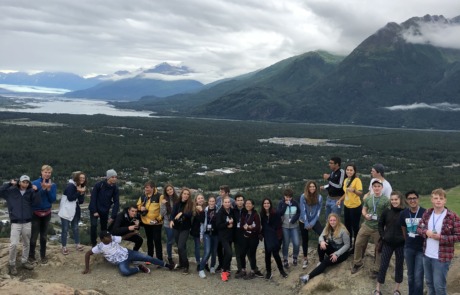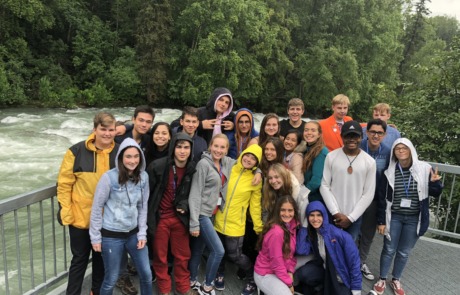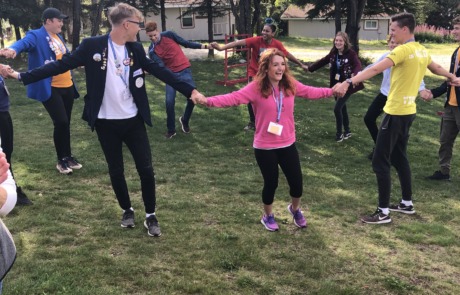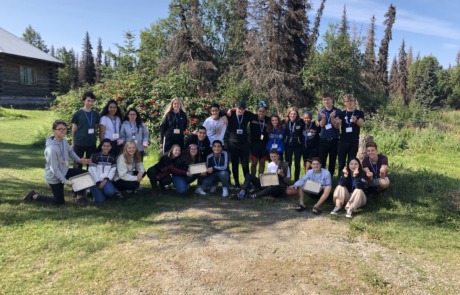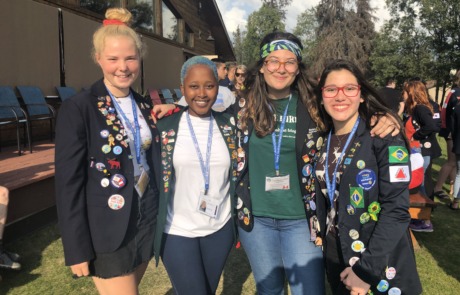
What’s a “Rebound” Exchange Student?
What’s a “Rebound” Exchange Student?
Rebound exchange students are individuals who return home after a year abroad on the Rotary Youth Exchange program. This transition year helps them reflect on their experiences and reintegrate into their home culture, school, and social circles.
In summary, Rebound exchange students go through a transition year where they reflect on their experiences abroad and reintegrate into their home culture. We support them during this time and encourage their active involvement in the program and Rotary activities.

Steven Adams – Germany 2013-2014
A Rotary blazer is the heaviest article of clothing you can wear. Yes, it’s covered in hundreds of pins from almost as many countries, and yes, you definitely don’t want to put it in your checked bag if you’re cutting it close on the weight limit, but the real weight of a Rotary blazer isn’t in the things pinned to it. Wearing that blazer is an honor, bestowed only on those who were brave enough to jump head-first into the unknown. The pins were collected through meeting people from places far different from your home, and from going to places you’d never even imagined. The weight of all these people and places grows heavier and heavier with each new person and experience, and it all comes rushing back the moment you put on that blazer. And this is the heaviest part. You don’t know if you’ll ever see these people again, or visit these places. You don’t know if you’ll ever again be the person you were when your blazer was empty. But if you wear a Rotary blazer, it means you’re strong enough to carry the weight. It means you’ve said goodbye to the greatest friends you’ve ever made, and you kept going. It means you left a place that you learned to love, and you kept going. It means that you learned a new culture, a new language, a new way of life, and that is a weight that you will carry with you forever.

Lily Foster – Alaska to Hungary 2015-2016
I have a quote that I think sums up exchange perfectly. “I had just come to accept that my life would be ordinary when extraordinary things began to happen. The first of these came as a terrible shock and, like anything that changes you forever, split my life into halves: Before and After.” The after effect of being an exchange student is an increased world understanding and a desire for more; more knowledge, more friendships, and more peace in the world.

Jasper Holton – Alaska to Germany 2015-2016
“My Year Abroad in Germany, and How it Changed Me”
I still remember the first day I arrived in Germany. It was a cloudy August morning, and the rain made streaks on the window of the airplane as we descended through a cloud. I left the plane to find myself in the Dusseldorf Airport, surrounded by a buzzing crowd of people. To the side of the gate, my host family stood together with a handmade sign, welcoming me to my new home. On that day I couldn’t even imagine what it would be like to leave after a year abroad. When that day came, I realized that the person who left for Germany a year ago was different from the person who came back. It was an eventful year, and I learned more from it than I could have ever imagined. Exchange changed me for the better in so many ways that I am still just beginning to understand. It was so fundamentally different from any other experience I have had, and so exceptionally challenging and rewarding that it had no less than a great influence on my life.
I found that as a result of my exchange, I have become more confident and assertive. During my exchange I came to understand just how important being confident is. Many experiences I had involved a lot of stress, discomfort and awkwardness. This was to be expected of course; adjusting to a new culture is by no means a smooth and easy process. However, these experiences gave me a lot of perspective and allowed me to see a more big picture view of myself. I realized that no one really cares if you make mistakes, or if you feel unwell, or if you feel awkward. People have a lot of things on their mind, and I found that I often overestimated how much people actually care about my mistakes. I also realized that if I wasn’t confident, I wouldn’t be able to get the things I wanted. To build relationships, I needed to be confident and assertive. I wouldn’t have been able to make friends if I wasn’t willing to take initiative. I also needed to speak up and ask for things I needed, and tell people when there were things that I didn’t like. Before my exchange, I was reluctant to start a conversation with a stranger. Beyond that, I was often uncomfortable trying new things. Because of my exchange, I am now much more comfortable facing new situations.
Another reason why I became more confident was because I became much better at identifying and learning from my mistakes. When I first got to Germany, I was making cultural mistakes at a mile a minute. From greeting new people to holding silverware, I was pretty much bound to be making some sort of cultural mistake every minute of the day. I was often called out on my mistakes by my host family and friends. Even when I wasn’t being called out, I realized my mistakes all the time. In the beginning, this bothered me a lot. It continued to bother me up until I realized that I was the only one who was bothered by my mistakes, and no one else really cared. With this realization, I was able to learn from my mistakes without looking at them negatively. I embraced myself and my mistakes, and learned from every one of them instead of worrying what other people were thinking. This was a great skill to have, because it made me much more confident in my decisions. I knew that if I thought through every decision I made, I could confidently make the decision and know that if it was the wrong one, I would learn from that decision and treasure what I learned without feeling bothered by my mistake.
During my exchange, I also had a great perspective on what my life was like before exchange. It gave me the opportunity to reflect on the things I enjoyed most, the things I missed, and the things I didn’t miss. I realized how much I enjoy computer science and programming, and how passionate I am about robotics and artificial intelligence. I realized how much I enjoy to build and program intelligent machines, and that this was something I would be happy doing for the rest of my life. Thus coming out of exchange, I had a very solid idea of not only what I want to study in the University, but also what I want to pursue as a career. I found that I developed a deeper commitment to my interest in programming, as well as a deeper understanding of my strengths and weaknesses and how they apply to my goals. This all came from the perspective and reflection that I experienced during my year abroad.
My exchange amounted to many things that I never expected. I experienced a new culture, learned a new language, gained valuable life skills, perspective, and learned to profit from my mistakes. At times it was challenging, and at times it was so easy it simply felt natural. I am sure that I will never forget what I learned during my year abroad, because it changed me for the better in so many ways that I will always treasure.

Angie Rubina – Kodiak to Denmark 2009-2010
Before exchange, I always searched for attention from others. I wanted to please people, and always wanted to be the center of attention. But now, I could care less. I’ve seen and experienced so many new things in such a short time span that sometimes I just need to be alone to think and be in the now.
The hustle and bustle of life used to excite me but now I want to lay in the grass, watch the trees, the clouds, listen to the birds and just appreciate the things around me; big and small. Of course, I still enjoy time with friends, but when they begin speaking of their minor problems of boys and sibling rivalries it makes me glad that I no longer mull over these problems.
I now know that peace and tranquility is a sense of being that I enjoy. I wish there were more who ignored the minor problems and just put themselves in the now rather than the what-if, the past or even the future.

Carly Besh – Petersburg (Anchorage) to Thailand 2009-2010
“Myself, a Thai”
I sit outside my Thai dance teacher’s studio, watching the people on old motorbikes zooming by, watching the cart vendors honking their horns as they pass, three honks for chicken, two for the Thai papaya dish “Somtom”, one long, one short for Thai ice cream that’s served atop of wonder bread. The smell of the gasoline and food swells in my mouth, and makes me feel home. Sweat is starting to take form of little round drops as the cloudless sky shines down on me. Country Thai songs about farmers losing their prized buffalo can be heard from car windows and the haircutters shop nearby.
When I’m asked now days about what I’ve changed about myself in life, I would respond “observation skills”. I can tell when people are down, when they hesitate, frown are happy or just what they are about say. Most importantly what they don’t.
Upon arrival in Thailand I knew the basis of the culture from reading travel guides and books but had no idea as to how to speak the language with the small exceptions of “It’s nice to meet you”, “Hello” and “Goodbye”. My life turned from hectic, busy to calm and exciting as though I had normal life then suddenly stuck in a monstrous forest and forced to fend for myself. And in that forest I had to learn about the trees and the animals living inside the forest. By observance, that’s exactly what I did. I learned the culture; take off your shoes before entering houses and shops, wear polite clothes for temples, recite homage to the Dharma in Pali and the “wai” in which you bow before elders giving respect to them the first time you meet them and every time after.
Before going, I didn’t look so natural doing the “wai”, by observance of my host families and the Thai people around me, I felt Thai. I did the same greetings as them, and actually perfected my authenticity to the point whereas some questioned my American roots. Without creating that change, without observance, I would have been a “Farang” (Foreigner) in Thailand but with it I was, I am a Thai. And Thailand is now a place I call home.

Stephanie Logan – Juneau to France 2009-2010
Foreign exchange is difficult to describe to someone who has never been, and even for someone who has it’s difficult to compare one exchange to another. One thing they all have in common is something at least every student gets out of the exchange; Knowledge of a new culture and of your own culture through the eyes of a foreigner.
I gained the ability to see my own problems in a broader and more realistic context. The things that seemed as if they were the worst that they could be are now mere inconveniences. I’ve seen the “green grass” on the other side and realized mine over here is green enough. I have also grown to be more objective in the sense that I categorize my problems and evaluate their importance and impact based on how many people are or will be affected and the greater good, if possible.
I learned a new way of life after living in the same house since the beginning of my own has allowed me to have something to compare to and learn from, much like looking at a picture and saying it’s bright as opposed to holding this picture up next to a darker or lighter one. I gained a clear understanding of my Alaskan lifestyle and of some of our values I wasn’t previously aware of. Adventure is an important part of the life my family and I live and don’t let ‘too dangerous’ hold us back. The activities during which we choose to spend our time together reflect what we value, such as skiing, fishing, and camping. In France, on the other hand, cuisine and dining are strongly valued and thus families choose to spend evenings around the dinner table together on a daily basis, whereas my Alaskan dinners are more for just whose hungry.
“You don’t get to pick your family.” This is a, while sometimes unfortunate, truth that we all come to accept throughout our years with our own. I had the unique opportunity to experience three other families and lifestyles and what a humbling experience it was. No, I didn’t get to pick my family, but I have come to appreciate the one that was chosen for me and if I could go back and change it, I wouldn’t change a thing.
Experiencing another culture and catching a glimpse at many others has put into perspective which problems are internationally mutual. Poverty is a big one, especially coming from Alaska where there are few who live in the streets, and seeing it in other cultures gave me a deeper understanding. Another issue I grasped, or that grasped me, is how history of other places is difficult to fully comprehend without visiting that place. Visiting the concentration camps and memorials really opened my eyes and brought my views and ideas of World War II out of the textbooks and into the real world with real peoples’ lives being affected.
Basking in the afterglow of exchange, I know the extreme memories will stay with me for a while [either positive or negative] but I will carry the lessons I have learned long after the memories have faded.

Douglas Plume – Anchorage to Switzerland 2009-2010
When I started school on exchange, it was the first time in years that I had been alone. At home, I have always had a stable circle of very good friends, many of whom I’ve known since kindergarten. In Switzerland at the beginning, I suddenly had no one. I didn’t speak the language of my classmates, so it was hard to understand what was going on. I had to actively seek out new friends and start conversations. The same was true of getting to know my host families. This has made me a more open and outgoing person, and I’m happy for it. I know that will help me at college and in my working life.
Before I left on exchange I had already started to examine different philosophies and form opinions different from those of my parents, though I know my year on exchange sped up this process. I was able to examine America from the outside, as well as see the strengths and weaknesses of another country. I was exposed to a more environmentally conscious lifestyle, which influenced how I want to live my life. I know this will make me more motivated, to make a difference in the world in the future.
I have always been independent in the sense that I have never relied on coaching from my parents to decide what I should think or do. I have always been able to think for myself. However, something that became clear to me on exchange was how dependent I was on my friends. My friends have always been hugely important to me, and I have relied on them for a great deal of support. At first losing contact with them was hard for me, but as I made new friends in Switzerland, I realized I would always have people who cared about me, and that I didn’t need to feel tethered to one particular group. In fact, as I’ve seen how much my old friends have changed, I’m not sure if I want to rebuild the close friendships I had with them. I know this will help me in the long run, because it will be easier for me to adapt to new social situations. This is good because I know I’ll go to college in a couple of years, and will probably lose touch with many of my childhood friends.
Americans in America have a very ethnocentric view of the world: “We are the greatest nation in the world!” But on exchange I got to experience the political and social climate of another country and I got to see America from the outside. Other countries have problems too, but there is much we could learn from them. If we say we are unquestionably the bst, we leave ourselves no room for improvement. I’m glad I got to see how things were done in another country. I truly feel like a citizen of the world, and I hope that mentality will help me to affect a change in American society, in any small way I can.

Frances Basketfield – Anchorage to Bolivia 2009-2010
When I was in Bolivia, I not only learned about myself, but I learned about my country, refracted through the culture’s perspective of another society and people.
When I left on exchange, I was young and independent to the point of foolhardy bullheadedness. In a similar manner, I see America stumbling forward down the path of progress, teetering between cultural integrity and the modernist consumer manifesto – with a belief that happiness can be bought. In Bolivia, my family could not afford the Internet, at times, and the money instead went toward the purchase of food or gas for the car, and I was forced to change my comfortable habit of passive technological interaction to the Wild West of face-to-face communication.
You would assume this would be easier than guessing the mysterious meaning of “lol” or “wtf,” but in all actuality is much scarier. On the Internet, if you say something wrong you can log out. In real life, there are no network failures and you have to deal with what you’ve said.
America, I believe, has a lot to explain away. As a country, America is possibly the most emulated country on earth, and unfortunately I feel as a society there’s not much worth emulating. While our government structure is admirable, the chant of democracy, and separation of church and state, is a continually drowned out by the war cry of “Me! My beliefs!” So other countries also yell, “Why not me, too?!” Instead of this trend toward emulation that spurs America toward greater heights, most Americans ignore the magnifying glass bearing down and continue to project selfish intolerance amplified by the solitary interest in the singular being, not the community.
Ironically, in Bolivia, a socialist country, poor, underfunded, seemingly so far below America, I felt more welcomed than I have anywhere else in my entire life. Where the importance of possessions doesn’t factor so much into their lives – the people around them do. In my first teetering steps toward life based more n the feelings and opinions of others, I was welcomed and helped by the culture of such a seemingly deprived country. Bolivia may be deprived of money. Of law enforcement. Of international power. But Bolivia, unlike America, is not deprived of happiness or personal contentment and connections.
My time in Bolivia was the warmest, most comfortable time in my life. It didn’t matter what I had, only who I was. And if I could teach anything to America as a whole it would be: so many people look up to us, why not present something more like Bolivia, where open arms are more important than open wallets.






